The Least-Understood Country
Bakhtiyar Akhmedkhanov

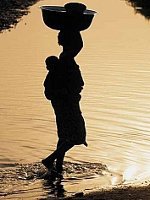 The story of the "African Cinderella"
The story of the "African Cinderella"
Recently the President of Equatorial Guinea Teodoro Obiang Nguema Mbasogo visited Moscow. The first official visit of the head of this African state to Russia may become equally significant for both countries. And it does not matter that the territory of Equatorial Guinea (28 thousand square kilometers) is barely half the size of the total area of the Moscow Region; the times when the significance of a country was measured by its size passed a long time ago. Equatorial Guinea has indeed something to offer and it truly makes this country a particular one.
The history of the rapid conversion of the African middle of nowhere into the pearl of the African continent began approximately ten years ago, when the offshore oil production started in the Gulf of Guinea. Actually, the oil was discovered there as early as in 1986. And not just oil, but a lot of oil. According to the data as of the year 2009, its proven reserves make up 1.1 billion barrels, though some sources quote much more impressive figures — up to 10% of the global reserves of the black gold.
Prior to the oil boom, this former Spanish colony lived mostly from the export of cocoa beans. At that time just very few Europeans or Americans knew about the existence of Equatorial Guinea — moreover, it was rather complicated to get there. And now airplanes from many European and African capital cities fly to Malabo, and instead of having just a few asphalted roads, the country is now riddled with fabulous autobahns, and more are under construction.
It is clear that the changes occurring in Equatorial Guinea at the moment are not welcomed by everyone. It was confirmed by a failed coup d'état attempt with the participation of foreign military contractors in 2004 and by an active campaign to discredit the country in some mass media, mainly in Spain. "Odnako" has been monitoring the situation in one of the most interesting countries of the African continent for a long time and we have written several times about accusations of corruption, which were as vehement as they were baseless. Detailed material on this theme was printed in №39 (55) of October 25, 2010 certain so-called journalists, without any evidence or even semblance of logic, were trying to wangle a money laundering story, involving no other than the country's President Teodoro Obiang and our compatriot Vladimir Kokorev, at one time owner of the shipping company Kalunga.
Meanwhile, compared to the absolute majority of African countries, the economic and political situation in Equatorial Guinea not only has failed to show any signs of deterioration over the recent years, but has in fact noticeably improved. GDP has steadily grown at double digits and GDP per capita is currently at 30 thousand USD; slightly higher than the GDP per capita of Spain.
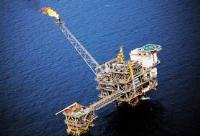 Anyway, it is always better to check things out on the ground yourself, and this is what we did; our correspondents have just returned from Equatorial Guinea, which is still arguably the most unknown and least understood African country. For one thing, no Russian journalists have been there for the last twenty years.
Anyway, it is always better to check things out on the ground yourself, and this is what we did; our correspondents have just returned from Equatorial Guinea, which is still arguably the most unknown and least understood African country. For one thing, no Russian journalists have been there for the last twenty years.
A bit of history
The first impression of Equatorial Guinea is that it is one big construction site. New airport runways, wharves, stadiums, residential areas, hotels, European quality roads — a sharp contradiction with conventional descriptions of a devastated and poverty stricken Africa populated by half-starved rag-tags with sub-machine guns.
Having said that, during the reign of the previous President, Masias, the above phenomena could be found in the country to the fullest extent. Local citizens shudder when they recall those years and say that the motto of Masias' reign could be easily summed up as "Back to the jungle!". It is sufficient to mention that one could get imprisoned just for an attempt to approach the airport after sunset. It was common knowledge that planes could not fly at night, so a right-minded citizen had nothing to do there.
When Masias ruled, the majority of educated people wanting to keep their lives left the country, the remaining citizens of which were converted into slaves, working for chicken feed at coffee and cocoa plantations. It must be said that in previous years the country exported not only cocoa beans, but also dramatic plots for writers and journalists. For example, in the famous book by Frederick Forsyth "The Dogs of War" the author refers to Equatorial Guinea (in the novel, Zangaro).
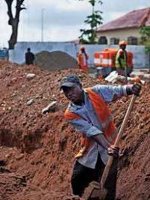 Or we may also remember a story that shook the world and took place in the American diplomatic mission in Santa Isabel (later — Malabo) in 1971. One diplomat stabbed another with a pair of scissors and, during the court proceedings in the United States, pleaded temporary insanity, brought about by being a witness to the barbarities of one of the most horrible African regimes. Apparently, the window of his house overlooked the police district.
Or we may also remember a story that shook the world and took place in the American diplomatic mission in Santa Isabel (later — Malabo) in 1971. One diplomat stabbed another with a pair of scissors and, during the court proceedings in the United States, pleaded temporary insanity, brought about by being a witness to the barbarities of one of the most horrible African regimes. Apparently, the window of his house overlooked the police district.
However, for fairness' sake, it should be said that most probably that murder had nothing to do with those barbarities, but rather with a difficult personal relationship between the diplomats.
Almost 30 years ago President Masias was overthrown, tried and shot dead.His nephew Teodoro Obiang became the new President, who very soon permitted opposition parties and called the new constitution adopted in November 1991 "a step towards democracy."
Equatorial Guinea is no longer called "the damned island" (the city of Malabo is located on the island of Bioco). Today it is said that Malabo is the friendliest capital city on the Western coast of Africa. To be honest, there is a noticeable lack of hotels and cellular communications operate rather inefficiently, but everything can be put right: hotels are under construction and most importantly there are more and more people arriving to stay at them.
Now the airport of Malabo receives planes round the clock. A flight from Europe takes six and a half hours only. The world has really become smaller.
Who lives happily in Malabo?
We first began to suspect that Equatorial Guinea would not live up to the vivid descriptions of devastation, poverty and starvation in that very plane, which was on the way from Paris to Malabo. The airbus was filled to capacity, but there was not a single woman in both of the cabins. Only serious men aged 25 to 65. And almost all of them were Americans.
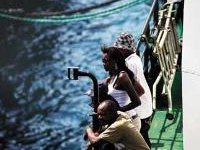 Soon it became clear that it was the personnel of companies involved in oil and gas extraction. They work on a rotational basis; the work shift lasts for 26 days. Engineers earn up to 12-15 thousand Euros per month, workers' salaries are naturally lower. Anyway, it makes sense to be absent from home for months and to endure long-distance flights from America to Europe, and then from Europe to Africa.
Soon it became clear that it was the personnel of companies involved in oil and gas extraction. They work on a rotational basis; the work shift lasts for 26 days. Engineers earn up to 12-15 thousand Euros per month, workers' salaries are naturally lower. Anyway, it makes sense to be absent from home for months and to endure long-distance flights from America to Europe, and then from Europe to Africa.
By the way, it was Americans who found oil in the shelf area of Equatorial Guinea. In the early 1980s Spaniards, who had received the right to conduct oil prospecting in the territorial waters from the country's government, looked for it for a long time and without success. And soon after the Spaniards having found nothing left, the American Company Walter International discovered the first large-sized oil deposit of Saphiro.
Later other companies entered the country, including the largest businesses of Mobil, Triton Energy, Marathon and others. The deposits in the shelf of Equatorial Guinea are of strategic significance, and here is why.
Oil companies operating in Africa are much more willing to invest funds in the development of deposits located in the sea than into the extraction on the continent. This is due to safety considerations, because the situation in the majority of countries rich in oil is not quite stable, to put it mildly. Local level leaders and para-military groups of various political persuasions (or without any persuasions at all) are looking forward to receiving their share of income from oil, which creates an array of problems both for central governments of such countries and for foreign extracting companies.
It is much easier for para-military outfits to damage a pipeline or to attack any onshore facility than to carry out raids on oil platforms, because the latter requires both significant material resources and basic training and discipline in the ranks of attackers. But even remoteness from the shore cannot provide for absolute security guarantees. A few years ago militants of the Nigerian Movement for the Emancipation of the Niger Delta attacked the oil platform of Bonga belonging to Royal Dutch/Shell, which was located more than one hundred kilometers away from the shore. As a result, the oil extraction was interrupted, and it meant 200 thousand barrels per day. Taking into account African realities, Equatorial Guinea is of interest not only from the point of view of oil and gas extraction, as the saying goes, here and now, but as a strategic partner in the future. The political situation in the country is stable, and authorities are not just loyal to foreign business, but also invest significant funds in infrastructure for its further development.
— The future of Equatorial Guinea? I am very optimistic about it, — said Humphrey, an American engineer with whom we talked in the industrial area of Punta Europe to the north of Malabo. — A beautiful country, friendly people, but what is most important — there is stability here. If everything continues the same way, very soon this will be the second Kuwait. You can see for yourselves all the construction that is going on here. And as for oil and gas, they will last for a long time. Humphrey works at a liquefied natural gas plant built by Atlantic Methanol, one of the leaders in methanol production. The plant's operating capacity is 3 thousand tons per day. Another even larger plant was built a short distance away by Marathon Oil Corporation — an oil and gas company from Texas. In the same area on the shore there is a wharf, where liquefied gas is pumped into gigantic tanks of special vessels. One of these tankers was just lying at the berth; the sight was impressive indeed.
A Guinean engineer, who once studied in the Soviet Union, has said that 60% of liquefied gas is transported to the United States, and the remaining 40% to Europe.
Apart from Americans, there are representatives of other countries working in Equatorial Guinea. For example, France has a very significant presence here, which is reflected not only in the large number of French companies operating in the country. Equatorial Guinea is situated in the zone of the Central African Franc and this currency's convertibility is provided for by Paris.
Moroccans build airports, roads and ports. The Lebanese trade. The Chinese construct, keep numerous shops, Internet cafes and bars. Cameroonians and Nigerians work at construction sites (many of them come and find employment illegally, which is a serious headache for local authorities).
Migrant workers are attracted by an opportunity to earn good money at numerous construction sites, moreover, locals, as a rule, prefer more prestigious and cleaner work. The scale of construction is astonishing: entire districts are built, where the dwellers of slums are resettled within the framework of a governmental program, and in place of the slums hotels and business centers appear. But new accommodation is not distributed free of charge, although on good conditions. For example, in the villa community of Buena Esperanza on the way to Malabo a house with a total area of 75 square meters costs 40 thousand US dollars, which are to be paid in installments. It is actually an interest-free loan. Electricity and gas are free of charge.
It should be noted that 40 thousand is the price for a villa located 200 meters from the sea shore; an apartment in a block of flats (we saw residential districts already prepared for settlement) is twice as cheap. Residential construction in the country is carried out mainly by Chinese companies.
Do not go over to anyone!
And as for Spanish business, it is very scarcely represented in Equatorial Guinea, and that is surprising — for not so long ago this country was a Spanish colony and could have preserved closer links with the former metropolis. But it is strange only at first sight. Anti-Guinean campaign in Spanish mass media began soon after Americans had found oil in the country; paralleling the behavior of an abandoned lover, who finds out, all of a sudden, that everything goes in the best way possible for his former companion. Accusations of corruption and human rights violation boomed with renewed vigor after a failed attempt at UNESCO to establish an award named after President Obiang. To be fair, the idea (probably coming from someone from the President's entourage) was not so brilliant — but it gave one more reason to talk about supposed abuses taking place in Equatorial Guinea.
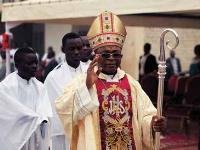 The former temporary charge d' affaires of the USA in this country, Anton K. Smith, called Equatorial Guinea "one of the least-understood countries [in the world]" in his telegrams to Washington. The texts of the telegrams were not intended for general public and became known to the public thanks to WikiLeaks. It is most interesting to find out the actual opinion of American diplomats regarding Equatorial Guinea, as they have gained notoriety for their lack of sympathy and even harshness towards most political figures of the world with who Washington officially maintains cordial or friendly relations. Unlike the absolute majority of their colleagues, who have rather critical attitudes to the countries of their sojourn, American diplomats defended this country from mass media attacks. Telegrams from Malabo are dedicated to the dispelling of the "black legend" that has taken shape due to the efforts of western journalists and representatives of some non-governmental organizations. Some of them, who have never been to Equatorial Guinea, compare it either with Uganda during the reign of the cannibal dictator Idi Amin, or with Iraq during the rule of Saddam Hussein, and from time to time even with Afghanistan, suggesting that something awful is going on in this country, although no one really knows what exactly.
The former temporary charge d' affaires of the USA in this country, Anton K. Smith, called Equatorial Guinea "one of the least-understood countries [in the world]" in his telegrams to Washington. The texts of the telegrams were not intended for general public and became known to the public thanks to WikiLeaks. It is most interesting to find out the actual opinion of American diplomats regarding Equatorial Guinea, as they have gained notoriety for their lack of sympathy and even harshness towards most political figures of the world with who Washington officially maintains cordial or friendly relations. Unlike the absolute majority of their colleagues, who have rather critical attitudes to the countries of their sojourn, American diplomats defended this country from mass media attacks. Telegrams from Malabo are dedicated to the dispelling of the "black legend" that has taken shape due to the efforts of western journalists and representatives of some non-governmental organizations. Some of them, who have never been to Equatorial Guinea, compare it either with Uganda during the reign of the cannibal dictator Idi Amin, or with Iraq during the rule of Saddam Hussein, and from time to time even with Afghanistan, suggesting that something awful is going on in this country, although no one really knows what exactly.
The diplomats do not turn a blind eye to drawbacks, though. The essence of their appraisal is the following: the country, which has broken away from the dark and poverty stricken past and which has suddenly grown rich, wishes to get everything and at once. This results in numerous mistakes, which are inevitable if the state institutions are weak. Nevertheless, Equatorial Guinea is moving forward, and the situation with human rights and democracy is not nearly as bad as the Spanish mass media are trying to suggest. Here is a quote from only one of the telegrams dispatched by Americans from Malabo: "Lies, Damned Lies, and Statistics: Many international agencies and institutions rate EG as among the worst of the worst in terms of almost any indicator selected. Yet, from ground level the story appears much better than reported. One problem is noise. The bias against EG is animated by a loud chorus of hostile critics from among the diaspora (many of whom left when things were much worse) and the once-colonial, now-disenfranchised Spanish. A dedicated and vicious segment of the Spanish media now effectively filters out most of the good news about EG, and provides a distorted frame of reference for anyone casually seeking information about the only former-Spanish colonial holding in Africa. Unfortunately, this creates a bias within the NGO community for those organizations that fail to undertake due diligence to confirm claims. The problems of EG, already exaggerated by an active and efficient internal rumor mill, are thus often blown all out of proportion by the country's opponents."
We got in touch with the former owner of Kalunga, Vladimir Kokorev,and asked him to comment on the mind-boggling campaign to discredit Equatorial Guinea, which is somewhat reminiscent of the Cold War propaganda. "If such a campaign really exists, — Mr. Kokorev said, — in any case, it is conducted not by the government of Spain, which, being a democratic country, is interested in maintaining its historical relationship with Equatorial Guinea. Take my word for it: my Spanish friends, who have been living and working in this country for decades (some of them were even born there and consider it to be their second motherland), from time to time are astonished with what they have to read in Spanish mass media about Equatorial Guinea." It is evident that there is a certain group of influential Spanish citizens, who perhaps do not even have real economic interests (there are more civilized methods for their realization) in Africa, but who are apparently suffering from the neocolonial nostalgia syndrome. Their actions inflict a lot of harm to both countries, which need each other and could collaborate to mutual benefit. Everywhere there are individuals, who cannot assert themselves in any way other than by attempting to tar the reputation of others. Spain, constantly shaken by endless media scandals with the participation of celebrities, is not an exception in this regard. President Obiang — what the heck! Very few people in the world were aware of his existence until it was found out that the son of the Iron Lady, Mark Thatcher, had been involved in the coup d'état attempt in Equatorial Guinea in 2004. The Spanish judiciary and media hitched their wagon even to the legendary 007 agent, Sean Connery.
As in all Spanish "corruption" scandals, the "Goldfinger case" (we kid you not; this is the official code name given to the police operation and later picked up by the Spanish press) is impossible to understand, despite, or perhaps because, of the ample coverage given to the case by the Spanish media. From the few facts that can be gathered from the extensive dribble published by the Spanish press, it seems that Sean Connery had the audacity to purchase a house in Marbella. The house was apparently built without all the necessary zoning permits (a common practice in Spain, by the way). There is some discrepancy as to what Mr. Connery is being exactly accused of — some media outlets proclaim that he is charged with corrupting a public official, others claim tax evasion. The lack of any plausible logical connection between these accusations and the supposed facts does not seem to bother anybody. And who cares that as a result of everything that the Spaniards tend to do in their own country, and then describe vividly in mass media, the country's investment attractiveness has fallen down to the lowest level among EU member states.
To the same category of "information" pertains the much talked-about war against the "Russian mafia", which, according to media reports containing terrible factual errors, is being carried on by Spanish law-enforcement agencies "with incredible hazard to life". And the journalists of the major Spanish newspaper El Pais, which actually used to be good printed matter, have pushed it even further by declaring that even if "Russians and Bulgarians can work together anywhere, it will be within the framework of the criminal group called "the Russian mafia". There is an odor of medieval xenophobia there. It is not surprising that the Spanish press, including El Pais, is suffering a deep crisis at the moment, which has left thousands of journalists unemployed. And what were they thinking about when inventing all that galimatia to ladle out to their subscribers?
Equatorial USSR, or Soviet Guinea
The population of Equatorial Guinea is about 600 thousand people. Taking into consideration that there are several hundreds of expatriates from the former Soviet Union permanently living in the country, it is possible to say that Russian is one of the most widespread languages here. And among sailors, shipbuilders and pilots of local companies, Russian is arguably the most common language.
In the port of Malabo passengers were boarding a vessel once built in Nikolayev, called Djibloho. Richer passengers occupied their seats in cabins; all the others took places on the deck.
— Can you see men with sub-machine guns? — The chief officer Sergey says. — It is security. Nearby there is an island belonging to Cameroon, there are pirates' bases there. Actually, they do not dare attack Guinean vessels — they are scared, but others are at the receiving end from time to time.
We heard a Russian command from the deck-bridge, and sailors took their posts asking in Spanish the passengers, who had occupied improper places, to step forward. Nearby on the deck there were sacks, in which swine permitted for transportation were moving drowsily. It was very hot.
Djibloho was leaving for the capital city of Malabo — in the country's insular part. The crew of the vessel consisted solely of Russians and Ukrainians working for a Guinean company under a contract. Many of them stay there in excess of the specified time limit and live in Africa for half a year. Answering the question about their leisure activities, all of them unanimously mention the Internet, and to be more exact — the Skype, where it is possible to communicate with their relatives for hours. After the collapse of the Soviet Union dozens of crews found themselves in African ports, their vessels being arrested by local authorities for debts. The majority of Soviet citizens did not have enough money to return to their motherland. Some of them were trying to find employment on the vessels of foreign companies, but such stranded sailors received a mere pittance for their work, and very often they were unreservedly cheated.
— I knew some guys, who lived with port prostitutes in Senegal and Cameroon, — tells Yuri, a superintendent of a Guinean company from Malabo. — And what else were they supposed to do if they had no food and no roof over their heads? Many of them came to the port regularly prior to the arrival of fishing vessels — to ask for fish.
Yuri has been living in Africa for 15 year now. He speaks fluent Spanish, knows Malabo as well as his native city in the Ukraine, and long ago he acquired various useful contacts here. In his homeland he has a family and grown-up children, with whom, in his words, no one knows what might have happened, but for this very Kalunga, in which almost 300 abandoned Soviet sailors once found their jobs.
— All these years my mother goes to the church every day and puts candles for the health of Vladimir Borisovich Kokorev, who actually saved all of us. And at that time… Do you know what we were once told in the Russian embassy in Cameroon when we asked to send us back home? They told us: you are Ukrainians now and have nothing to do with us. The only thing we might do is to send coffins with your bodies back home… In Equatorial Guinea there is no Russian embassy. But there used to be the Soviet embassy here. Among local Russians there circulates a very popular story telling that one ex-Soviet woman, who had been left by her Guinean husband, came to ask diplomats for some milk for her little daughter. During those faraway years the country was almost starving. They refused to help the woman. Wives of Africans, who had left the USSR, were considered to be almost like traitors, and Soviet specialists detached to the country were forbidden from communicating with them.
Nevertheless, all the compatriots working here call themselves Soviet, joking. And as for their business here, it is also Soviet, respectively. And what else might they call it if in the dock of Malabo one sees Lithuanians, Estonians, Ukrainians, and Russians working side by side? And even Bulgarians — a prompt for journalists from El País looking for the "Russian mafia".
Prescriptions from Doctor Obama
Unlike the Soviet Union, Russia has practically no representation in Equatorial Guinea. To be more exact, there is a covenant signed a year ago between Gaspromneft and the Guinean GEPetrol, according to which the Russian company will carry out geologic exploration and seismic investigations, and then a decision will be made regarding the exploratory well drilling. Therefore, it is still too early to speak about real Russian presence in the country.
This is even more of a pity because Russia has a resource in Africa, which the absolute majority of other countries lack, — people, who received education in the Soviet higher education institutions, who remember the Russian language and truly consider Russia if not their second homeland, at least a cognate country.
 When the graduate of Volgograd Medical Institute Justino Obama was checking in at Sheremetyevo, all the frontier guards were laughing at him: everyone was carrying electric irons and kettles, and this one — a suitcase full of books. After arriving home, Justino became the first Guinean surgeon in the country and a short time after — a hospital chief executive in Bata. Now Doctor Obama is the head of the committee on the national healthcare in the parliament of Equatorial Guinea and is a deputy of the Pan-African Parliament.
When the graduate of Volgograd Medical Institute Justino Obama was checking in at Sheremetyevo, all the frontier guards were laughing at him: everyone was carrying electric irons and kettles, and this one — a suitcase full of books. After arriving home, Justino became the first Guinean surgeon in the country and a short time after — a hospital chief executive in Bata. Now Doctor Obama is the head of the committee on the national healthcare in the parliament of Equatorial Guinea and is a deputy of the Pan-African Parliament.
The country's main problem, according to Justino (local Russians call him Ustinych), is the absence of skilled personnel.
— We desperately need specialists, moreover, in all the industries without exception. I was the only local surgeon, but even now there are inexcusably few Guinean surgeons — just six people. Nothing remains for us, but to invest funds in people's education and in the society's modernization, otherwise there might be a risk of facing serious challenges. Petrodollars are a good thing, of course. But they are dangerous, because they demoralize people — in particular, if they do not possess enough knowledge and culture. Look, a lot of people in this country are not willing to work —everyone wants to be a boss. Even such a rich country as ours will not endure half a million of bosses!
Justino says that he does not understand why Russia's policy in the African direction is so passive. — Take the government of practically any country: everywhere there are ministers, who studied in the USSR. Even in the small Equatorial Guinea there are three of them. They are people occupying key posts in their countries — just think, how many opportunities! Last year in Moscow, at the business forum "Russia-Africa", I proposed to create something similar to an informal association of African politicians with Soviet education. Actually, many interesting ideas were proposed there. But a yearhas elapsed — and what? And nothing.
Doctor Obama told us that one of the forum's deputies, although he had studied in Russia for about ten years, delivered his speech in French. This is because in the course of many years he failed to meet any person in his country to whom to speak in Russian. The language tends to be forgotten more quickly than we think. In Justino's family two languages are spoken. He communicates in Russian with his wife Emma, and in Spanish — with the children. His two daughters are studying in Spain, the younger son is still living with his parents. Only the eldest daughter, who was born in her mother's homeland in Makeyevka, speaks Russian. But all three of them also know French and English.
Liturgy in Mongomo
Mongomo is a town with the population of seven thousand people at the eastern border of Equatorial Guinea. At this very border the asphalted road ends, and further on there is an ordinary traffic control barrier, behind which a washed out unpaved road leads to neighboring Gabon.
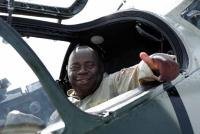 We were driving to Mongomo from Bata — in other words, across the entire country from the West to the East. The highway paved through the jungle was of such quality that if we had not been busy watching magnificent views, it could have been absolutely possible to sleep all the 250 kilometers of the way leaning against the windowpane and feeling no jogging at all.
We were driving to Mongomo from Bata — in other words, across the entire country from the West to the East. The highway paved through the jungle was of such quality that if we had not been busy watching magnificent views, it could have been absolutely possible to sleep all the 250 kilometers of the way leaning against the windowpane and feeling no jogging at all.
The shower forest with trees, so nothing like theage-long European oak-trees, the high bushes, mountain rivers, reddish soil under our feet and the sky of unseen blue over the crowns. These forests harbor the famous black gorillas, and it is forbidden to hunt them.
From time to time we saw villages along the road, which, as a rule, consisted of a couple of dozen of one-storied wooden houses, a small church and a wooden shed with a "bar" sign board. Country bars were similar to each other even by their names. Most often the locations were called "Friendship" and (it is interesting to know, why?) "Florida".
In one of the villages we saw the inhabitants celebrating the birth of a baby girl all together. Men were drinking beer separately from women, who were singing and dancing, while the happy mother was breastfeeding the newly-born child. Ordinary rural old women were dancing with such zest that compared to them even the most enthusiastic TV extravaganza show might seem a depressing funeral cortege.
Mongomo is the President's homeland. The quality of the highways is not connected to this circumstance — today good roads are laid to all the cities and villages of Equatorial Guinea. But this town truly receives special attention. Just look at the new cathedral — a reduced copy of St. Paul's Cathedral in the Vatican. It is said that the Roman Pope himself may arrive for the opening this summer.
Also, a college started operating in Mongomo, where specialists for the tourist industry will be trained — cooks, waiters, and hotel managers. The opening of the college was attended by President Obiang, who declared in his speech: "We can and we must become a self-sufficient country. As oil will be exhausted sooner or later, already now it is necessary to invest the funds from its sales in the creation of the infrastructure for leisure industry. We have all the opportunities for the development of tourism — nice climate, pure ocean and magnificent beaches. We should only learn how to use all that properly."
The following day the President was present at a liturgy in an old church of Mongomo. All the citizens got together in the square in front of the temple, where benches were placed. Many congregants took some food with them, which was to be consecrated prior to the festive feast. For the same purpose several cows and swine were brought to the church and then tied up. Nearby, but separately from them, a crocodile was waiting for its lot, his jaws and paws tied with wire.
Prior to the beginning of the liturgy the church jazz band (trumpet, saxophone, bass guitar and percussion) played a few splendid compositions, and then a female choir turned in their performance. Seven or eight men played some local percussive instruments distantly reminiscent of the xylophone; choristers sang waltzing slightly and making synchronous movements with their arms. It is impossible to describe it. It should be seen with one's own eyes, in order to admire the whole ceremony, captivated by the delight, even if this delight is not quite religious.
The liturgy was served by the new bishop Juan Nsue Ejang. People were listening to him very attentively, nodding assent from time to time.
— We are praying for stability, — a man said, who was standing nearby. — You do see what is happening around. And here everything is quiet.
Let it remain as it is.
In a square in Mongomo's center there is a small stela with the busts of the three leaders of the country: of Bonifacio Ondo (he was the head of the internal autonomy, which was proclaimed as far back as by the Spaniards), of the shot dictator Francisco Masias and of the actual President Teodoro Obiang, who superseded him. Here it is — the respect for the national history.
A group of schoolchildren were taking pictures at the samestela together with their teachers. The oldest of the teachers was apparently a foreigner. As we found out from the conversation, she was Spanish, her name was Rosaria, and she had come to Africa with the Church and had been living there for 19 years. Answering the question whether she liked living in Equatorial Guinea, Rosaria said:
— I like it very much! It is so quiet here, and we all know each other. It is some sort of a small family country.
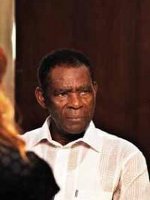 Russia is a friend country
Russia is a friend country
The President of Equatorial Guinea and the actual chairman of the African Union, Teodoro Obiang Nguema Mbasogo, told Odnako what his country may interest Russia with and why Russia is so interesting for his country.
— First of all, I would like to say that Russia is a friend country for us. At one time the Soviet Union rendered invaluable help to many young African countries. Now the time is different. The USSR does not exist anymore, but Russia has not stopped being our friend. Yes, due to objective reasons our relations have become less active, but they have never been interrupted. And today we are extremely interested in the collaboration with Russia. We need your technologies, your skilled specialists in practically all industries; we would also like to send our youngsters to study to Russian higher education institutions.
What can we offer in exchange? Equatorial Guinea is rich not only in oil and gas. We have other environmental assets. Russian companies might take part in their development.
Odnako: At the opening of a college in Mongomo you said that the funds gained from the sales of oil and gas would be invested in the creation and development of tourist infrastructure. And what about other industries? Teodoro Obiang: In other industries as well. For example, in agriculture, the dire state of which is one of the main problems of many African countries. We depend on food imports. Once Equatorial Guinea was among the major global cocoa beans exporters, today it is not the case. It is wrong. Petrodollars will end sooner or later, and the land will always give fruit.
Other important areas for investments are the national healthcare and education. We want our youngsters to participate in the government of the country and in the management of economy more actively. By the way, the forthcoming summit of the African Union, which is to take place in our Malabo, will be conducted under the motto "More trust to youngsters — for the sake of stable development."
Odnako: Equatorial Guinea passed through a severe period of dictatorship. In one of the interviews you said that your country was just learning democracy. And when will it be possible to say that you have already learnt democracy?
Teodoro Obiang: I think it cannot be said about any country in the world. Democracy is not a static position that has been achieved once and forever. It is an incessant process of developing and improving our people power institutions. Yes, the colonial period and its consequences caused such a situation that African countries have stepped on this path later. But we are moving forward, and that is the main thing. Today Equatorial Guinea is a multiparty state. Not all of the existing parties support the government. There is an opposition, and it is normal. It is not normal when some opposition leaders, instead of carrying out political work and opposing to the government with the use of legitimate methods, recruit mercenaries, engage in arms smuggling and prepare assassinations of legitimately elected leaders of the state. In the past it used to happen in this country. Our state and our government are not going to put up with it.
Odnako: What do you think about the future of the African Union? May it become some sort of EU in Europe in the future? Teodoro Obiang: Perhaps, only in the future. African countries are very different — both by their culture and traditions and by economic development. Now the main objective is to develop unified approaches regarding key current issues, basing them on our common democratic values, and to follow them for the benefit of each other.
Subscribe to Pravda.Ru Telegram channel, Facebook, RSS!


